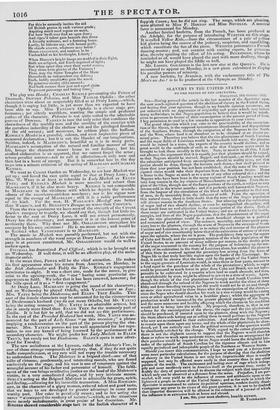SLAVERY IN TIIE UNITED STATES.
characters were about as respectably filled as at Drury Lane,—which, SIR—Having perused the article in the last number of the Spectator upon though it is saying but little, is yet more titan we expected to have the now much-agitated question of the abolition of slavery in the United States, been able to say. Miss TAYLOR'S Ophelia is a clever stage per- and fearing that your opinions, though in my humble opinion erroneous, are formance ; yet utterly worthless, wanting the simple and profound yet enforced with an appearance of oi iginality and power which may induce pathos of the character. Polonius is not quite stated to the admirable many wellwishers to the Negro population to believe that it would be injudi- powers of DOWTON. FARREN is now the only actor that combines the cious to persevere in favour of their emancipation at the present period of time, shrewdness of the worldly man and the servility of the courtier with I beg permission to send in a few remarks in opposition to your views. the garrulous imbecility of the shallow wit and the privileged freedomThe grand objection which you raise to the practicability of the emancipa- of the old servant ; and moreover, he seldom plays the buffoon. tion of the Slaves, is the supposed instantaneous abandonment and depopulation of the Southern States, through the emigration of the Negroes to the North KEMBLE'S Hamlet is a graceful, solemn, and even impressive piece of and the West, where land is so abundant as to be obtained at an almost no. measured declamation; but it is not the Hamlet of our imaginations. minal price. Therefore you believe that the rice plantations of South Carolina Neither, indeed, is MACREADY'S, beautiful as it is in many parts. and the sugar fields of Louisiana would be thenceforth laid waste, the planters MACREADY'S assumption of the natural and familiar manner of real would be ruined in a mass, the exports of the country would decline, and so life, brings the character nearer home to our feelings ; but his great would be the multitude of evils to arise that Congress never could be studied elaboration is so apparent, that we cannot forget the actor ; brought to look them steadily in the face. Now, in answer to all this, I shall whose peculiar manner—not to call it affectation—is only now and not advance the argument that it is equally just that planters should be ruined, then lost in a burst of energy. But it is somewhat late in the day as that Negroes should be starved, flogged, and destroyed,—or that though all to go into a minute criticism of the acting of MACREADY and CHARLES the calamities anticipated from emancipation should in reality atke, yet that
KEMBLE. justice should he done, though the heavens rush down,—but shall proceed to show that your position has not been established, that the mass of the enian-
We went to Covent Garden on Wednesday, to see how Macbeth was cipated slaves would take their departure from the Southern States. Home order. Negro life in that truly horrible region upon the banks of the Mississippi. In-


























 Previous page
Previous page